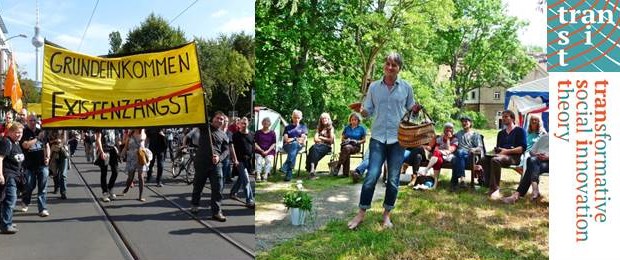What is degrowth?
Degrowth is an idea that critiques the global capitalist system which pursues growth at all costs, causing human exploitation and environmental destruction. The degrowth movement of activists and researchers advocates for societies that prioritize social and ecological well-being instead of corporate profits, over-production and excess consumption. This requires radical redistribution, reduction in the material size of the global economy, and a shift in common values towards care, solidarity and autonomy. Degrowth means transforming societies to ensure environmental justice and a good life for all within planetary boundaries.

Essential for degrowth is:
> Striving for a self-determined life in dignity for all. This includes deceleration, time welfare and
conviviality.
> An economy and a society that sustains the natural basis of life.
> A reduction of production and consumption in the global North and liberation from the one-sided Western paradigm of development. This could allow for a self-determined path of social organization in the global South.
> An extension of
democratic decision-making to allow for real political participation.
> Social changes and an orientation towards
sufficiency instead of purely technological changes and improvements in efficiency in order to solve ecological problems. We believe that it has historically been proven that
decoupling economic growth from resource use is not possible.
> The creation of open, connected and localized economies.
This definition of degrowth is based on the definition of
Research and Degrowth, which the organizational team of the degrowth conference in Leipzig adapted and which was further edited by the
editorial team of the web portal.
We distance ourselves from forms of growth critique which do not aim for the good life for all. We object to all right-wing, racist and sexist forms of growth critique.
Why the word “degrowth”?
English speakers sometimes find the word ‘degrowth’ problematic and it can lead to misunderstandings. Reading just the word, it has a negative, and for some, a non-ecological connotation. But the origin of the term is anything but that. It is to be found in Latin languages, where “la décroissance” in French or “la decrescita” in Italian refer to a river going back to its normal flow after a disastrous flood. The English word “degrowth” became prominent after the first international degrowth conference in Paris in 2008. It has since than been established in academic writing as well as in the media and is used by social movements and practitioners. An advantage of using a term which does not roll off the tongue easily in English is that it creates disruption. Disruption in a world where the critique of economic growth is a radical position.
The editorial team of the degrowth web portal decided to use the English term "degrowth" to name the page. As a German translation we use "Postwachstum" in texts. The words "Wachstumsrücknahme" and "Entwachstum" we use synonymously.
> Here you can read a history of degrowth
Further introducing materials
> More to read
> More to listen and watch
> Introductory entries in the media library


